4.动词时态语态
动词时态与语态总结

动词时态与语态总结动词时态和语态是英语语法中的重要概念,准确运用时态和语态可以使语言更加准确、流畅。
本文将对动词时态和语态进行总结和归纳,帮助读者更好地掌握这方面的知识。
一、动词时态1. 一般现在时(Simple Present Tense)一般现在时表示经常性、习惯性或普遍真理的动作或状态。
句子结构为主语+动词原形。
Example: She dances every evening.(她每天晚上跳舞。
)2. 一般过去时(Simple Past Tense)一般过去时表示过去发生的动作或状态。
句子结构为主语+动词过去式。
Example: They went to the park yesterday.(昨天他们去了公园。
)3. 一般将来时(Simple Future Tense)一般将来时表示将来发生的动作或状态。
句子结构为主语+will/shall+动词原形。
Example: I will travel to London next week.(我下周将去伦敦。
)4. 现在进行时(Present Continuous Tense)现在进行时表示现在正在进行的动作。
句子结构为主语+be动词+动词-ing形式。
Example: She is studying at the library.(她正在图书馆学习。
)5. 过去进行时(Past Continuous Tense)过去进行时表示过去某个时间正在进行的动作。
句子结构为主语+was/were+动词-ing形式。
Example: They were having dinner when the phone rang.(电话响时,他们正在吃晚饭。
)6. 将来进行时(Future Continuous Tense)将来进行时表示将来某个时间正在进行的动作。
句子结构为主语+will/shall+be+动词-ing形式。
Example: We will be waiting for you at the airport tomorrow.(明天我们将在机场等你。
英语动词的时态和语态
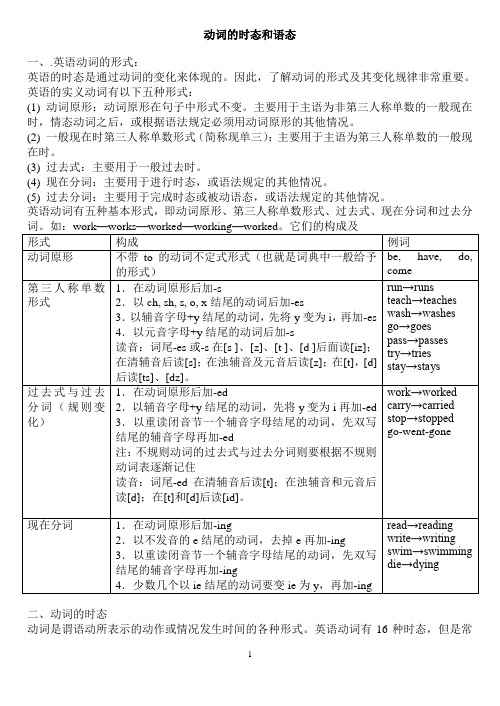
动词的时态和语态一、.英语动词的形式:英语的时态是通过动词的变化来体现的。
因此,了解动词的形式及其变化规律非常重要。
英语的实义动词有以下五种形式:(1) 动词原形:动词原形在句子中形式不变。
主要用于主语为非第三人称单数的一般现在时,情态动词之后,或根据语法规定必须用动词原形的其他情况。
(2) 一般现在时第三人称单数形式(简称现单三):主要用于主语为第三人称单数的一般现在时。
(3) 过去式:主要用于一般过去时。
(4) 现在分词:主要用于进行时态,或语法规定的其他情况。
(5) 过去分词:主要用于完成时态或被动语态,或语法规定的其他情况。
英语动词有五种基本形式,即动词原形、第三人称单数形式、过去式、现在分词和过去分二、动词的时态动词是谓语动所表示的动作或情况发生时间的各种形式。
英语动词有16种时态,但是常用的只有9种:一般现在时、一般过去时、一般将来时、现在进行时、过去进行时、现在完成时、过去完成时、过去将来时、现在完成进行时。
下面分别介绍。
1、一般现在时结构:do/does have/has be(am/is/are)标志语:often,always,usually,sometimes,never,every day ,in +时间段,等。
(1)表示经常性、习惯性的动作;表示主语的身份和特征a. He goes to school every day.b. He is a student/handsome.(2)表示永恒的真理,即使出现在过去的语境中,仍用一般现在时。
如:I learned that the earth goes around the sun when I was in primary school.(3)少数动词用于谈论时间表、节目单或日程表上所安排好的事情。
此类动词有begin, come, leave, go ,arrive, start , stop, return, open, close等The train leaves at 8:50. The meeting begins at seven.b. The rain starts at nine in the morning.(4) 在时间状语从句和条件状语从句中,用一般现在时表示将来。
动词的语态和时态的区别与用法
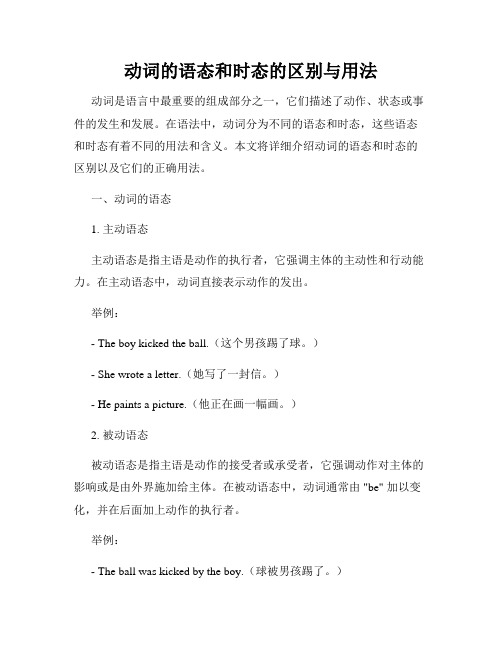
动词的语态和时态的区别与用法动词是语言中最重要的组成部分之一,它们描述了动作、状态或事件的发生和发展。
在语法中,动词分为不同的语态和时态,这些语态和时态有着不同的用法和含义。
本文将详细介绍动词的语态和时态的区别以及它们的正确用法。
一、动词的语态1. 主动语态主动语态是指主语是动作的执行者,它强调主体的主动性和行动能力。
在主动语态中,动词直接表示动作的发出。
举例:- The boy kicked the ball.(这个男孩踢了球。
)- She wrote a letter.(她写了一封信。
)- He paints a picture.(他正在画一幅画。
)2. 被动语态被动语态是指主语是动作的接受者或承受者,它强调动作对主体的影响或是由外界施加给主体。
在被动语态中,动词通常由 "be" 加以变化,并在后面加上动作的执行者。
举例:- The ball was kicked by the boy.(球被男孩踢了。
)- A letter was written by her.(一封信被她写了。
)- The picture is being painted by him.(这幅画正在被他画。
)被动语态多用于强调动作的接受者或者主体的无法执行动作的情况。
二、动词的时态1. 现在时现在时态用于表示目前正在进行或经常发生的动作、状态或事件。
举例:- I go to school every day.(我每天去学校。
)- She is reading a book now.(她现在在读一本书。
)- They often play football on weekends.(他们经常在周末踢足球。
)2. 过去时过去时态用于表示已经发生或已经结束的动作、状态或事件。
举例:- I went to the park yesterday.(我昨天去了公园。
)- He studied in the library for three hours.(他在图书馆学习了三个小时。
动词的时态和语态
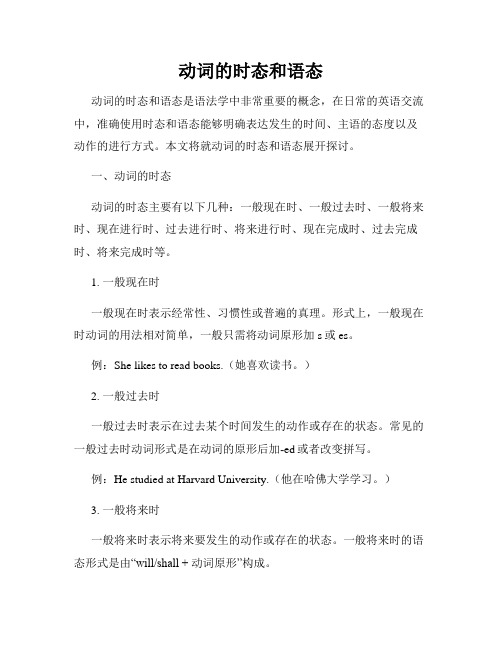
动词的时态和语态动词的时态和语态是语法学中非常重要的概念,在日常的英语交流中,准确使用时态和语态能够明确表达发生的时间、主语的态度以及动作的进行方式。
本文将就动词的时态和语态展开探讨。
一、动词的时态动词的时态主要有以下几种:一般现在时、一般过去时、一般将来时、现在进行时、过去进行时、将来进行时、现在完成时、过去完成时、将来完成时等。
1. 一般现在时一般现在时表示经常性、习惯性或普遍的真理。
形式上,一般现在时动词的用法相对简单,一般只需将动词原形加s或es。
例:She likes to read books.(她喜欢读书。
)2. 一般过去时一般过去时表示在过去某个时间发生的动作或存在的状态。
常见的一般过去时动词形式是在动词的原形后加-ed或者改变拼写。
例:He studied at Harvard University.(他在哈佛大学学习。
)3. 一般将来时一般将来时表示将来要发生的动作或存在的状态。
一般将来时的语态形式是由“will/shall + 动词原形”构成。
例:I will go to the park tomorrow.(明天我将去公园。
)4. 现在进行时现在进行时表示正在进行的动作。
现在进行时的时态形式是由“be 动词(am/is/are)+动词-ing形式”构成。
例:They are playing basketball now.(他们现在正在打篮球。
)5. 过去进行时过去进行时表示过去某个时间正在进行的动作。
过去进行时的时态形式是由“was/were + 动词-ing形式”构成。
例:He was studying at the library yesterday.(昨天他在图书馆学习。
)6. 将来进行时将来进行时表示将来某个时间正在进行的动作。
将来进行时的时态形式是由“will be + 动词-ing形式”构成。
例:They will be traveling to Europe next month.(他们下个月将要去欧洲旅行。
动词的时态与语态变化

动词的时态与语态变化动词是语言中的重要组成部分,通过时态与语态的变化,我们可以清晰地表达出事件发生的时间和态度。
时态指的是动作或状态发生的时间,分为过去、现在和将来三个时态。
而语态则表示动作的主体与客体之间的关系,主要分为主动语态和被动语态。
在语言表达中,正确运用动词的时态和语态变化是非常重要的,下面将从几个方面详细介绍动词的时态与语态变化。
一、动词的时态变化1. 过去时态(Past Tense)过去时态用于表示已经发生或已经完成的动作或状态。
动词的过去时态一般由动词原形后加上-ed结尾来构成,例如:- I walked to school yesterday.(昨天我走路去学校。
)- She cooked dinner for her family last night.(她昨晚为家人做饭。
)2. 现在时态(Present Tense)现在时态用于表示正在发生或经常性发生的动作或状态。
动词的现在时态一般由动词原形来表示,例如:- They play tennis every Sunday.(他们每个星期天打网球。
)- The sun rises in the east.(太阳从东方升起。
)3. 将来时态(Future Tense)将来时态用于表示将要发生的动作或状态。
动词的将来时态一般由助动词will或shall加上动词原形构成,例如:- We will go on a trip next week.(下周我们将去旅行。
)- She shall study hard for the exam.(她将为考试努力学习。
)二、动词的语态变化1. 主动语态(Active Voice)主动语态表示主语是动作的执行者或实施者。
在主动语态中,主语在句子中承担着主要的语法成分,动词根据主语的人称和数的变化而变化。
例如:- They built a new house.(他们建了一座新房子。
)- She writes articles for a magazine.(她为一家杂志写文章。
动词时态和语态
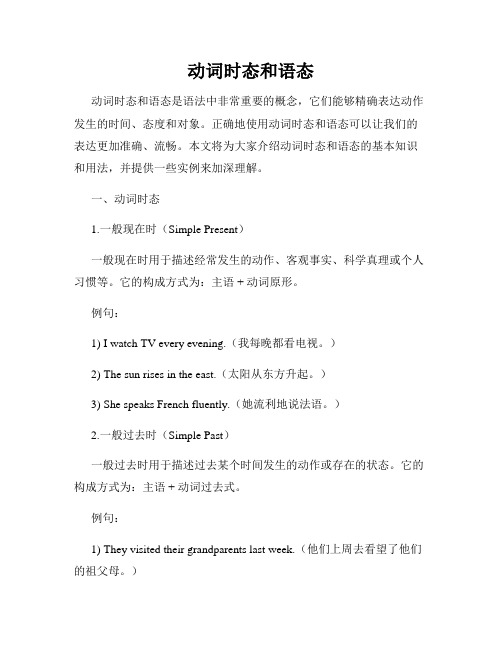
动词时态和语态动词时态和语态是语法中非常重要的概念,它们能够精确表达动作发生的时间、态度和对象。
正确地使用动词时态和语态可以让我们的表达更加准确、流畅。
本文将为大家介绍动词时态和语态的基本知识和用法,并提供一些实例来加深理解。
一、动词时态1.一般现在时(Simple Present)一般现在时用于描述经常发生的动作、客观事实、科学真理或个人习惯等。
它的构成方式为:主语 + 动词原形。
例句:1) I watch TV every evening.(我每晚都看电视。
)2) The sun rises in the east.(太阳从东方升起。
)3) She speaks French fluently.(她流利地说法语。
)2.一般过去时(Simple Past)一般过去时用于描述过去某个时间发生的动作或存在的状态。
它的构成方式为:主语 + 动词过去式。
例句:1) They visited their grandparents last week.(他们上周去看望了他们的祖父母。
)2) I lived in London for five years.(我在伦敦生活了五年。
)3) He didn't finish his homework yesterday.(他昨天没完成作业。
)3.一般将来时(Simple Future)一般将来时用于描述将要发生的动作或存在的状态。
它的构成方式为:主语 + will + 动词原形。
例句:1) I will call you later.(我过会儿会给你打电话。
)2) They will travel to Japan next month.(他们下个月会去日本旅行。
)3) She won't be here tomorrow.(她明天不会在这里。
)4.现在进行时(Present Continuous)现在进行时用于描述当前正在进行的动作。
它的构成方式为:主语+ am/is/are + 动词-ing。
动词的时态和语态

【翻译句子】 (7) He told me he read an interesting novel last night. 他告诉我他昨晚看了一本有趣的小说。 【结论2】如果从句中有一个过去的时间状语,尽 管从句中的动作先于主句发生,但从句中的谓语动 词仍用过去式。 【结论3】表示两个紧接着发生的动作,常由以下 词语连接,用一般过去时。常见连词有:but, and, when, as soon as, immediately, the moment, the minute。 如 : He rushed into the room and sat down immediately.
【疑难2】 We had no sooner been seated than the bus started. = No sooner had we been seated than the bus started. 【疑难剖析2】hardly / scarcely…when (before);no sooner…than表示“一……就……”。
3. 一般将来时 【翻译句子】 (8)我们下周将会讨论这个话题。 We will talk about this topic next week. 【结论1】表示未来的动作或状态常用will / shall + 动词(常与表示将来的时间状语连用,如tomorrow, next week等)。
【翻译句子】 (9) The bus is coming. 公共汽车就要到了。 【结论2】表示一种趋向或习惯动作。表示趋向行 为的动词,如come,go,start,begin,leave等词, 常用进行时的形式表示将来时。
【疑难2】The room remains clean. You are allowed to speak here. 【疑难剖析2】下面四类动词不宜用现在进行时: a. 表示心理状态、情感的动词:like, love, hate, care, remember, believe, want, mind, wish, agree, mean, need。 b. 表存在的状态的动词:appear, exist, lie, remain, seem, belong to, depend on。 c. 表示瞬间动作的动词:allow, accept, permit, promise, admit, complete。 d. 表示感官的动词:see, hear, notice, feel, smell, sound, taste, look。
动词的时态与语态

动词的时态和语态一.动词的时态1.一般现在时(1)表示现在经常性或习惯性的动作。
Sometimes we often play basketball after school.(2) 表示某种永恒的事实或普遍真理。
The earth moves round the sun.(3) 在if, unless, when, until, after, before, as soon as, the moment等连词引导的表示时间或条件的从句中用一般现在时表示将来。
I will tell him all about it as soon as (the moment) he comes back.2. 现在进行时(1)现在进行时表示目前或现阶段正在进行的动作或发生的事情。
We are eating more now.(2) 与频率副词always, constantly, continually, often, all the time, again等连用表示说话人的某种感情色彩(赞叹,厌烦,埋怨等)He is always helping others.My younger brother is constantly losing keys.(3) 表示将来,近期安排的按计划要进行的事情(往往有一个表示将来的时间状语),常用的动词有come, go, leave, start, arrive, return, work, play, stay等。
Are you staying here till next week?Mary is leaving on Friday.3.现在完成时现在完成时表示动作发生在过去,但强调与现在情况仍有联系,其结果或影响仍存在。
(1)for+时间段,since+时间点They have lived in Beijing for five years.(2) 常见的时间状语:lately, recently, just, already, yet, up to now,till now, so far, these days. in the past few------, over the past few----, throughout centuries, throughout histories.So far(up till now) I have only read half the story.I haven’t seen much of him recently.(these days)(3) 表示“第几次做某事”It\This\That is thefirst\second\third---time that 或在It\This is the best \worst\most interesting +名词+that后面跟现在完成时。
动词的时态和语态
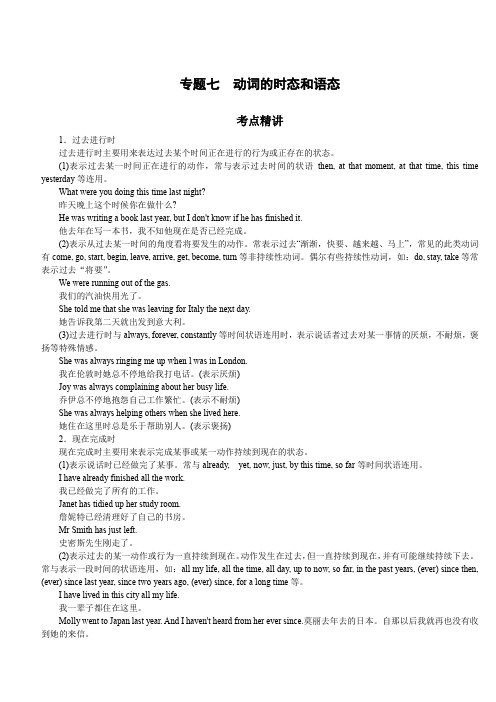
专题七动词的时态和语态考点精讲1.过去进行时过去进行时主要用来表达过去某个时间正在进行的行为或正存在的状态。
(1)表示过去某一时间正在进行的动作,常与表示过去时间的状语then, at that moment, at that time, this time yesterday等连用。
What were you doing this time last night?昨天晚上这个时候你在做什么?He was writing a book last year, but I don't know if he has finished it.他去年在写一本书,我不知他现在是否已经完成。
(2)表示从过去某一时间的角度看将要发生的动作。
常表示过去“渐渐,快要、越来越、马上”,常见的此类动词有come, go, start, begin, leave, arrive, get, become, turn等非持续性动词。
偶尔有些持续性动词,如:do, stay, take等常表示过去“将要”。
We were running out of the gas.我们的汽油快用光了。
She told me that she was leaving for Italy the next day.她告诉我第二天就出发到意大利。
(3)过去进行时与always, forever, constantly等时间状语连用时,表示说话者过去对某一事情的厌烦,不耐烦,褒扬等特殊情感。
She was always ringing me up when l was in London.我在伦敦时她总不停地给我打电话。
(表示厌烦)Joy was always complaining about her busy life.乔伊总不停地抱怨自己工作繁忙。
(表示不耐烦)She was always helping others when she lived here.她住在这里时总是乐于帮助别人。
英语语法中的动词时态和语态

英语语法中的动词时态和语态动词时态和语态是英语语法中非常重要的概念。
时态表示动作发生的时间,而语态则表示动作的主动与被动关系。
掌握好动词时态和语态的使用,可以帮助我们更准确地表达自己的意思,提高英语写作和口语表达的能力。
一、动词时态1. 现在时态现在时态用来表示现在正在进行的动作或状态。
例如:I am writing an article.(我正在写一篇文章。
)2. 过去时态过去时态用来表示过去发生的动作或状态。
例如:She studied English last night.(昨晚她学习了英语。
)3. 将来时态将来时态用来表示将来要发生的动作或状态。
例如:We will go to the beach tomorrow.(我们明天要去海滩。
)4. 现在完成时态现在完成时态用来表示过去发生的动作对现在产生的影响或结果。
例如:I have finished my homework.(我已经完成了作业。
)5. 过去完成时态过去完成时态用来表示过去某一时间点之前已经完成的动作。
例如:She had already left when I arrived.(当我到达时,她已经离开了。
)6. 将来完成时态将来完成时态用来表示将来某一时间点之前将会完成的动作。
例如:By theend of this month, I will have graduated from university.(到本月底,我将已经从大学毕业了。
)二、动词语态1. 主动语态主动语态表示主语是动作的执行者。
例如:He wrote a letter.(他写了一封信。
)2. 被动语态被动语态表示主语是动作的承受者。
例如:The letter was written by him.(这封信是他写的。
)动词的时态和语态的正确使用对于表达准确的意思至关重要。
下面是一些使用动词时态和语态的注意事项:1. 时态的一致性在一篇文章或一句话中,时态应该保持一致,不要随意变换时态,以免造成混淆。
动词的时态和语态

动词的时态和语态一、一般现在时1、表示经常发生的习惯性的、现在反复出现的动作或状态,常用的时间状语有:always,usually,seldom, sometimes, eve ry day, now and then, once a week等。
2、表示眼下或目前等现在时间所发生的动作或存在的状态,这种状态带有一定的持续性。
3、表示客观事实或普遍真理。
4、书报的标题,故事的叙述,小说、戏剧、电影等情节介绍,图片的说明等。
5、时间表、时刻表、日程表、节目单、课程表等按规定将要发生的动作,只限于go, arrive, leave, start, stay, return, begin, come等动词。
6、在时间、条件、方式、让步状语从句中,表示将来的动作。
注意:一般现在时可以用于定语从句或宾语从句中表示将来。
7、用在某些表达中,表示现在正在发生的动作或存在的状态。
Here comes the bus!How it rains!二、一般过去时1、表示在过去某一时间点发生的动作或所处的状态,与现在没有关系。
常用的时间状语有:yesterday, last night, at that time等。
2、表示在过去某一段时间里反复出现的动作或状态,与现在没有关系。
3、用used to do或would do表示过去经常或反复发生的动作。
4、有些情况发生的时间没清楚表明,但实际上是“刚才,刚刚”发生的,属于过去时间,应使用过去时态。
常见的有I didn’t know…或I forgot…等。
5、一般过去时可与today, this week, this month等时间状语连用。
三、一般将来时1、will/shall do(1)表示将来会出现的动作或状态。
常用的时间状语:this evening, tomorrow, next week/month…,at the end of this term, in a few minute s等。
动词的四种时态

动词的四种时态动词的四种时态 时态是⼀种动词形式,不同的时态⽤以表⽰不同的时间与⽅式。
它是表⽰⾏为、动作、状态在各种时间条件下的动词形式,在英语中有16种时态。
以下是⼩编为⼤家整理的动词的四种时态相关内容,仅供参考,希望能够帮助⼤家。
动词的四种时态1 (1)⼀般现在时: ⼀般现在时的构成 1. be动词:主语+be(am, is, are)+其它。
如: I am a boy. 我是⼀个男孩。
2. ⾏为动词:主语+⾏为动词(+其它)。
如: We study English. 我们学习英语。
当主语为第三⼈称单数(he, she, it)时,要在动词后加"-s"或"-es"。
如:Mary likes Chinese.玛丽喜欢汉语。
动词+s的变化规则 1.⼀般情况下,直接加-s,如:cook-cooks, milk-milks 2.以s. x. sh. ch. o结尾,加-es,如:guess-guesses, wash-washes, watch-watches, go-goes 3.以“辅⾳字母+y”结尾,变y为i, 再加-es,如:study-studies (2)⼀般过去时: 动词过去式详解动词的过去式的构成规则有: A、规则动词 ①⼀般直接在动词的后⾯加ed:如 worked , learned , cleaned , visited ②以e结尾的动词直接加d:如 lived , danced , used ③以辅⾳字母加y结尾的动词要改y为i再加ed(此类动词较少)如 study – studied carry – carried worry – worried (注意play、stay不是辅⾳字母加y,所以不属于此类) ④双写最后⼀个字母(此类动词较少)如 stopped B、不规则动词(此类词并⽆规则,须熟记)⼩学阶段要记住以下动词的原形和过去式:sing – sang , eat – ate , see – saw , have – had , do – did , go – went , take – took , buy – bought , get – got , read – read ,fly – flew , am/is – was , are – were , say – said , leave – left , swim – swam , tell – told , draw – drew , come – came , lose – lost , find – found , drink – drank , hurt – hurt , feel – felt (3)⼀般将来时: 基本结构: ①be going to + do; ②will+ do. be going to = will I am going to go swimming tomorrow(明天). = I will go swimming tomorrow. (4)现在进⾏时: am,is,are+动词现在分词 动词现在分词详解动词的ing形式的构成规则: ①⼀般的直接在后⾯加上ing , 如doing , going , working , singing , eating ②以e 结尾的动词,要先去e再加ing ,如having , writing ③双写最后⼀个字母的(此类动词极少)有:running , swimming , sitting , getting 动词的四种时态2 ⼀般现在时 主要⽤来表⽰⼈、事物的现在状况和特点;表⽰经常或习惯性的动作,句⼦中常有often, always, from time to time 等时间状语;表⽰客观规律和永恒真理等。
英语动词时态、语态、语气
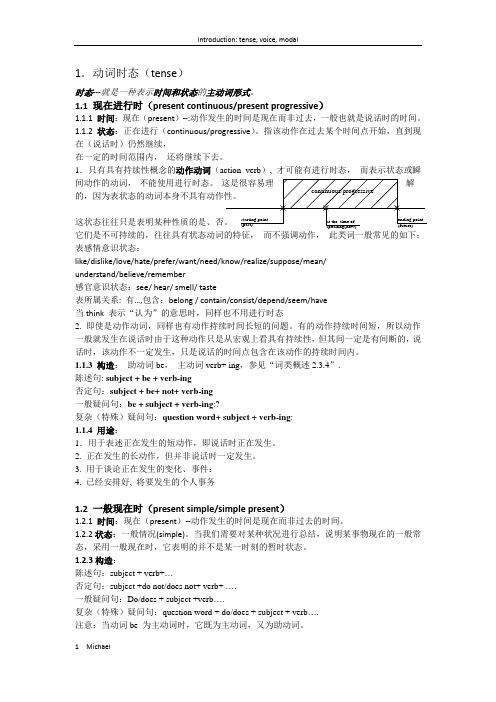
1.动词时态(tense )时态---就是一种表示时间和状态的主动词形式。
1.1 现在进行时(present continuous/present progressive )1.1.1 时间:现在(present )--:动作发生的时间是现在而非过去,一般也就是说话时的时间。
1.1.2 状态:正在进行(continuous/progressive )。
指该动作在过去某个时间点开始,直到现在(说话时)仍然继续,在一定的时间范围内, 还将继续下去。
1.只有具有持续性概念的动作动词(action verb ), 才可能有进行时态, 而表示状态或瞬间动作的动词, 不能使用进行时态。
它们是不可持续的,往往具有状态动词的特征, 而不强调动作, 此类词一般常见的如下:表感情意识状态:like/dislike/love/hate/prefer/want/need/know/realize/suppose/mean/understand/believe/remember感官意识状态:see/ hear/ smell/ taste表所属关系: 有…,包含:belong / contain/consist/depend/seem/have当think 表示“认为”的意思时,同样也不用进行时态2. 即使是动作动词,同样也有动作持续时间长短的问题。
有的动作持续时间短,所以动作一般就发生在说话时由于这种动作只是从宏观上看具有持续性,但其间一定是有间断的,说话时,该动作不一定发生,只是说话的时间点包含在该动作的持续时间内。
1.1.3 构造: 助动词be , 主动词verb+ ing ,参见“词类概述2.3.4”.陈述句: subject + be + verb-ing否定句:subject + be+ not+ verb-ing一般疑问句:be + subject + verb-ing :?复杂(特殊)疑问句:question word+ subject + verb-ing :1.1.4 用途:1.用于表述正在发生的短动作,即说话时正在发生。
高考英语语法:动词的时态和语态
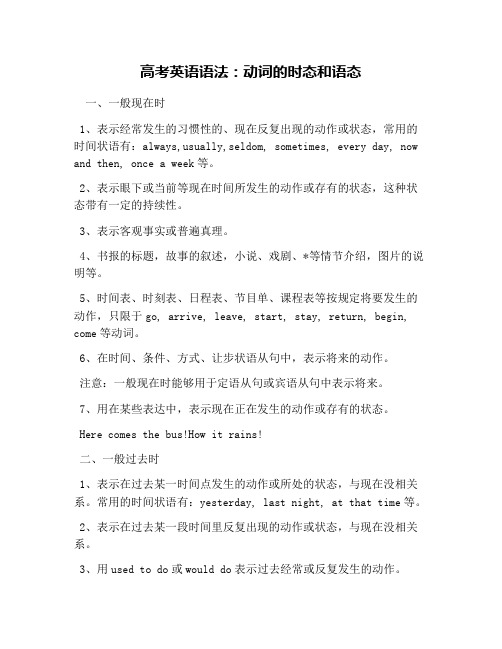
高考英语语法:动词的时态和语态一、一般现在时1、表示经常发生的习惯性的、现在反复出现的动作或状态,常用的时间状语有:always,usually,seldom, sometimes, every day, now and then, once a week等。
2、表示眼下或当前等现在时间所发生的动作或存有的状态,这种状态带有一定的持续性。
3、表示客观事实或普遍真理。
4、书报的标题,故事的叙述,小说、戏剧、*等情节介绍,图片的说明等。
5、时间表、时刻表、日程表、节目单、课程表等按规定将要发生的动作,只限于go, arrive, leave, start, stay, return, begin, come等动词。
6、在时间、条件、方式、让步状语从句中,表示将来的动作。
注意:一般现在时能够用于定语从句或宾语从句中表示将来。
7、用在某些表达中,表示现在正在发生的动作或存有的状态。
Here comes the bus!How it rains!二、一般过去时1、表示在过去某一时间点发生的动作或所处的状态,与现在没相关系。
常用的时间状语有:yesterday, last night, at that time等。
2、表示在过去某一段时间里反复出现的动作或状态,与现在没相关系。
3、用used to do或would do表示过去经常或反复发生的动作。
4、有些情况发生的时间没清楚表明,但实际上是“刚才,刚刚”发生的,属于过去时间,应使用过去时态。
常见的有I didn’t know…或I forgot…等。
5、一般过去时可与today, this week, this month等时间状语连用。
三、一般将来时1、will/shall do(1)表示将来会出现的动作或状态。
常用的时间状语:this evening, tomorrow, next week/month…,at the end of this term, in a few minutes等。
动词的时态和语态

6.现在完成时:have/has been+过去分词 The classroom has been cleaned . 7.过去完成时:had been+过去分词 When we got there, the classroom had been cleaned . 8.含情态动词的被动语态:表示某动作可能、 应该、必须被做(情态动词+be+过去分词) The classroom must be cleaned every day
8.现在完成进行时: 助动词have/has+ been+v-ing We have been learning English for four years.
*表示状态用be+表语(常用名词或形容词)。
1.现在的状态:am, is, are+表语: I am a student. He is my classmate. 2.过去的状态:was, were+表语: I was 16 last year. They were my classmates. 3.将来的状态:will be+表语: He will be a teacher next year.
3.一般将来时: (1) 助动词will/shall+动词原形: (2)be going to+动词原形: He will play basketball tomorrow. He is going to play basketball tomorrow.
4.现在进行时:助动词am/is/are+v-ing He is playing basketball now.
5.过去进行时:助动词was/were+v-ing He was playing basketball at ten yesterday.
动词的语态与时态

一.动词的时态和语态动词的时态英语中表示不同时间发生的动作或存在的状态,需用不同的动词形式表示,这种不同的动词形式称为时态(Tense)。
高中阶段我们需掌握十一种时态的用法。
一.一般现在时(1)表示现在经常发生或习惯性的动作或状态,常与usually, always,sometimes, every day, once a week等时间状语连用。
(2)在时间,条件状语从句中表将来的动作。
e.g. The volleyball match will be put off if it rains. (表示将来)如果下雨,排球赛将推迟。
(3)主句中的谓语动词是过去时态,但宾语从句中如果所说的是客观真理,它的谓语动词用一般现在时。
e.g. The teacher told us that the moon goes around the earth.(4)表示安排或计划好的将来动作(只限于少数几个动词:go, come, start, leave等)。
e.g. The summer holidays begin next week. 暑假从下周开始。
School begins the day after tomorrow. 后天开学。
The plane takes off at 2:00 in the afternoon. 飞机下午两点起飞。
(5)在新闻标题,小说和电影以及戏剧情节介绍中常用一般现在时。
e.g. American Ambassador leaves Beijing. 美国大使离京(新闻标题)。
二. 现在进行时(1)表示说话人说话时正在进行的动作,译成汉语“正在”。
这一用法常和表示此刻的时间状语连用,如now, at the moment, at present等。
e.g. It's raining hard now.天正在下大雨。
(2)表示现阶段而并非归眼下(此刻)正在进行着的动作。
动词时态及语态的用法解析

动词时态及语态的用法解析动词时态是用来表示动作或状态发生的时间的,而语态则是表示主语与动作或状态之间的关系。
正确的使用动词时态和语态能够准确地表达出所要传达的意思。
本文将对动词时态及语态的用法进行解析,以帮助读者更好地理解和运用这些语法知识。
一、动词时态的用法1. 现在时态(Present Tense)现在时态表示目前正在进行或经常发生的动作。
它有以下几种形式:a) 一般现在时:用于表示客观事实、经常发生的动作或现在的状态。
例如:I live in Beijing.(我住在北京。
)b) 现在进行时:用于表示现在正在进行的动作。
例如:She is studying in the library.(她正在图书馆学习。
)c) 现在完成时:用于表示过去发生的动作对现在产生的影响或结果。
例如:I have finished my homework.(我已经完成作业了。
)2. 过去时态(Past Tense)过去时态表示过去发生的动作或状态。
它的常见形式如下:a) 一般过去时:用于表示过去发生的某个动作或状态。
例如:We went to the beach last summer.(我们上个夏天去了海滩。
)b) 过去进行时:用于表示过去某个时间段内正在进行的动作。
例如:She was playing the piano when I arrived.(我到达时她正在弹钢琴。
)c) 过去完成时:用于表示过去某个时间之前已经完成的动作或状态。
例如:They had already left when I got there.(我到达时他们已经离开了。
)3. 将来时态(Future Tense)将来时态表示将来发生的动作或状态。
它一般有以下几种形式:a) 一般将来时:用于表示将来某个时间发生的动作或状态。
例如:I will visit my grandparents next week.(下周我要去看望我的祖父母。
重点归纳:动词的时态和语态
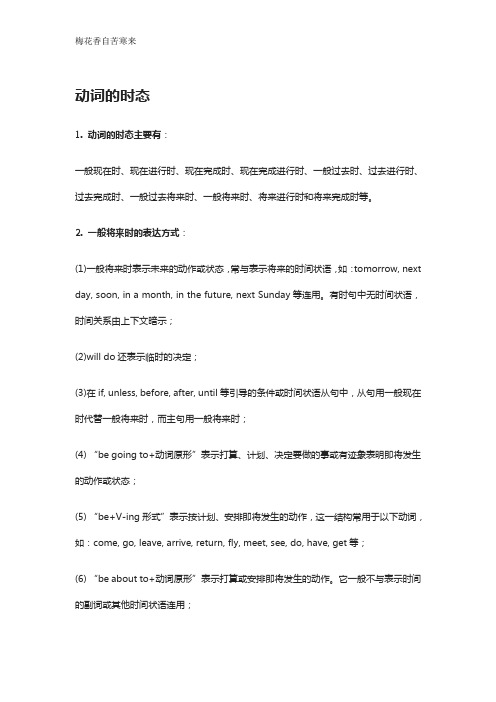
动词的时态1. 动词的时态主要有:一般现在时、现在进行时、现在完成时、现在完成进行时、一般过去时、过去进行时、过去完成时、一般过去将来时、一般将来时、将来进行时和将来完成时等。
2. 一般将来时的表达方式:(1)一般将来时表示未来的动作或状态,常与表示将来的时间状语,如:tomorrow, next day, soon, in a month, in the future, next Sunday等连用。
有时句中无时间状语,时间关系由上下文暗示;(2)will do还表示临时的决定;(3)在if, unless, before, after, until等引导的条件或时间状语从句中,从句用一般现在时代替一般将来时,而主句用一般将来时;(4) “be going to+动词原形”表示打算、计划、决定要做的事或有迹象表明即将发生的动作或状态;(5) “be+V-ing形式”表示按计划、安排即将发生的动作,这一结构常用于以下动词,如:come, go, leave, arrive, return, fly, meet, see, do, have, get等;(6) “be about to+动词原形”表示打算或安排即将发生的动作。
它一般不与表示时间的副词或其他时间状语连用;(7) “be to+动词原形”表示按计划、安排即将发生的动作;(8) 一般现在时表示按时刻表或根据规定将要发生的动作,这一结构常用于表示位移的动词,如:come, go, leave, start, begin, take off, set off等。
动词的语态1. 一般现在时的被动语态:is/am/are+V-ed。
例如:English is widely spoken all over the world.2. 一般过去时的被动语态:was/were+V-ed。
例如:The underground was built five years ago.3. 一般将来时的被动语态:①will/shall be+V-ed。
专题八 动词的时态、语态

③表单纯性的将来,与人的主观愿望和判断无关 时。 If it's made of wood, it will float on water. 这要是木材做的,它能浮在水面上。 (4)当主句为一般将来时态时,在 if, as soon as, until, when等引导的状语从句中用一般现在时代替一 般将来时。 I will call you as soon as I get there. 我一到那儿就给你打电话。
②表示过去经常或反复发生的动作,常与 always , usually, often, 度的时间状语连用。 When I was a child, I often played football in the street. 当我是个孩子的时候,我经常在街上踢足球。 注:表示过去经常发生或反复发生的动作,也可 用 used to或 would+动词原形。 I used to go to the library every Sunday. 我以前每个周日都去图书馆。 never,sometimes等表示频
(5)动词的现在进行时表将来。 常见的动词有 go, come, leave, stay, start等。 Joe is leaving for London. 乔就要动身去伦敦。
(6)be about to do 结构表示客观、马上就要发生 的事,一般不与具体的时间状语连用。 be to do结构表示按职责、义务和要求必须去做 或即将发生的动作。 The plane is about to take off. 飞机就要起飞了。 Jenny is to be married next month. 珍妮下个月 结婚。
When shall we finish homework? 我们应该什么时候完成作业? I shall make a cake for your birthday tomorrow. 明天我将为你的生日制作一个蛋糕。
(完整版)动词的时态和语态变化规则

(完整版)动词的时态和语态变化规则一、动词的时态变化规则动词的时态指的是动作发生的时间。
汉语中的动词时态有三种形式:过去时、现在时和将来时。
下面是动词在不同时态下的变化规则:1. 过去时动词的过去时表示动作或状态发生在过去的时间。
在汉语中,动词的过去时通常通过在动词前加上过去时标志词(如“了”、“过”、“了解”等)来表示。
例如:- 我昨天去了图书馆。
- 她去年去过美国。
2. 现在时动词的现在时表示动作或状态发生在现在的时间。
在汉语中,动词的现在时可以通过以下几种方式来表示:- 在动词前面加上表示现在的时间状语(如“现在”、“正在”、“每天”等)- 在动词前面加上表示频率的词语(如“经常”、“常常”、“总是”等)例如:- 我现在在写作业。
- 他经常打篮球。
3. 将来时动词的将来时表示动作或状态将要发生的时间。
在汉语中,动词的将来时可以通过以下几种方式来表示:- 在动词前面加上表示将来的时间状语(如“明天”、“以后”、“将来”等)- 在动词前面加上表示计划或意向的词语(如“打算”、“计划”、“想要”等)例如:- 我明天要去游乐园。
- 她打算明年去留学。
二、动词的语态变化规则动词的语态表示动作的主体与动作的关系。
汉语中的动词语态有两种形式:主动语态和被动语态。
1. 主动语态在主动语态中,动作的执行者是动词的主语。
这种语态表达的是动作的主体主动地执行了动作。
例如:- 她写了一首诗。
- 我们清理了房间。
2. 被动语态在被动语态中,动作的执行者是动词的宾语。
这种语态强调的是动作的接受者。
被动语态的构成是:动词“是/被” + 动词的过去分词。
例如:- 这篇文章被他认为很好。
- 这个问题被我们解决了。
以上是动词的时态和语态变化的基本规则,希望对您有所帮助。
- 1、下载文档前请自行甄别文档内容的完整性,平台不提供额外的编辑、内容补充、找答案等附加服务。
- 2、"仅部分预览"的文档,不可在线预览部分如存在完整性等问题,可反馈申请退款(可完整预览的文档不适用该条件!)。
- 3、如文档侵犯您的权益,请联系客服反馈,我们会尽快为您处理(人工客服工作时间:9:00-18:30)。
2011-2012全国各地中考英语试题汇编之单项选择---------动词时态与语态【2011•河南省】1. —I called you at 4:00 yesterday afternoon, but no one answered.—Sorry, I _____ with my friends at that time.A. swimB. swamC. will swim D, was swimming【2011•河南省】2.—Excuse me, where is Mr. Brown's office?—Sorry, I don't know. I_____ here for only a few days.A. workB. workedC. have workedD. will work【2011黑龙江绥化市】3.—Where is Bob?—He______to Harbin for a meeting.A.wentB. has beenC. has gone【2011黑龙江绥化市】4. Don't make so much noise. The children_______an English lesson.A. haveB. are havingC. were having【2011江苏徐州】5. I was very angry with John—he just_______ when I spoke to him.A. isn’t listeningB. hasn’t listenedC. didn’t listenD. wasn’t listening【2011江苏徐州】6. — Are you going to the bank, Laura?—No, I _______ to the bank already.A. have beenB. have goneC. am goingD. had been【2011内蒙古包头】7. Mr. Black is going to marry a girl he _______ in Japan last year.A. meetsB. metC. has metD. would meet(2011四川资阳)8. So far this year, many new houses ________ in Wenchuan with the help of the government.A. buildB. are builtC. will buildD. have been built【2011天津】9. My grandmother ______ a lot of changes in Tianjin since she came here.A.sees B. can see C. will see D. has seen【2011乌鲁木齐】10.The meeting _ by the time I got there yesterday.A. was onB. has been onC. had begunD. has begun【2011•广西柳州】11.—You have found your lost umbrella, haven’t yo u?—Yes. I _____ it behind the door this afternoon.A. have foundB. will findC. found【2011沈阳】11. Listen! The phone ___. Please go to answer it.A. ringsB. is ringingC. rangD. will ring(2011贵州毕节)12.I many new friends since I came here.A.make B.made C.will make D.have made【2011梧州】13. I met a good friend of mine while I on the street.A. walksB. walkC. was walkingD. am walking【2011梧州】14. –I don’t know if Mr. Li ____ to the party this evening.-- I think he will come if he ____ free.A. will come; isB. will come; will beC. comes; isD. comes; will be【2011贵州贵阳】15. "Where's your brother, Jane?" "He's not in Guiyang these days. He________ Beijing.'A. has gone toB. has been toC. had been to【2011湖南湘西】16. What’s the best present you have ever ________?A. receivedB. receivesC. receiving【2011湖南湘西】17. —What are you doing?—I’m ________ TV.A. watchingB. watchesC. watched【2011沈阳】18. The computer is broken. ___it___today?A. Will; repairB. Has; repairedC. Will; be repairedD. Has; been repaired【2011雅安】19. She _______ this book for nearly three weeks.A. has borrowedB. has lentC. has boughtD. has kept【2011襄阳】20. ---- Why won’t you go to the movie with me, Gina?---- Because I it twice.A. seeB. have seenC. sawD. will see【2011广东】21. —Alan, it’s late. Why not go to bed?—Jenny hasn’t come back yet. I _______ for her.A. waitedB. have waitedC. am waitingD. was waiting【2011四川德阳】22. – It _____ hard outside. You have to stay at home.A. rainB. is rainingC. rained【2011四川德阳】23. – Do you know who cleaned the blackboard, Tina?-- Yes. John _____.A. doB. doesC. did【2011四川德阳】24. If you _____ your homework, you can go out to play football.A. finishB. will finishC. are finishing【2011上海】25. By the end of last month, I _____ all the CDs of Justin Bieber.A) collect B) collected C) have collected D) had collected【2011上海】26.Now my father _____ his bike to work every day instead of driving.A) ride B) rode C) rides D) will ride【2011上海】27. We are glad to hear that the Greens _____ to a new flat next week.A) move B) moved C) will move D) have moved【2011湖南永州】28. -Where's your father, Tom? -He__ to Changsha.A. goesB. wentC. has gone【2011湖南长沙】29. When I came back yesterday evening, my brother ________ his homework.A is doing B. has done C. was doing【2011湖南长沙】30. ---Have you ever been to Shanghai?---Yes. I ________ there a few months ago.A have been B. went C. have gone【2011山东】31. - What is Tom doing now?- He ______ basketball over there.A. is playingB. will playC. has playedD. was playing【2011山东】32. - What did Mr. Smith do before he came to China?- He ______ in a car factory.A. worksB. workedC. is workingD. will work【2011山东】33. - Where is my sister, mum?- She ______ to the library. She will be back soon.A. has beenB. is goingC. has goneD. will go【2011•盐城】34. Mr. White came to our school in 2008, and since then he us English.A. teachesB. taughtC. has taughtD. will teach【2011·苏州】35.—Please turn off the TV. The baby ______. —OK. I’ll go out for a walk.A. sleepsB. sleptC. is sleepingD. was sleeping【2011安徽芜湖】36. —China develops so fast.—That’s true. It ______ a lot already.A. changesB. changedC. will changeD. has changed【2011湖北·武汉】 37 . John likes playing soccer very much and he _____ about one hour playing it every day.A. spentB. will spendC. has spentD. spends【2011湖北·武汉】 38. Tom was so careless that he _____ his right arm when he was riding to school.A. hurtsB. hurtC. has hurtD. had hurt【2011湖北·武汉】 39. - Jim isn’t in the classroom. Where is he?- He _____ to the teacher’s office.A. will goB. has goneC. had goneD. is going【2011梧州】40. — Please turn off the radio, grandma ___now.— OK, I'll do it right now.A.is sleepingB. will sleepC. sleptD. sleeps【2011雅安】41. They _____ England and they will be back next week.A. have gone toB. have been toC. have gone inD. has been on【2011本溪】42.—Is Mr. Smith still in Shanghai?—Yes, he ______ there for two months.A. has beenB. has goneC. has been toD. has gone to【2011本溪】43.—Were you at school when he came to see you?—Yes, I ______ a math class.A. hadB. was havingC. am havingD. have【2011•宁夏】44. My brother and I _____ in Yinchuan since 1997.A. had livedB. have livedC. liveD. will live【2011•宁夏】45. Tom, along with three other boys, seen playing football a moment ago.A. isB. wasC. areD. were【2011•宁夏】46. —When will he leave for Shanghai?—As soon as he _ his work.A. finishedB. will finishC. is finishingD. finishes2011凉山】47.Ten minutes ago, there ________ an eraser, a pen and some books on the desk.A. wasB. wereC. is【2011浙江丽水】48.—Guess What! The great movie is on in the cinema.一Nothing new.I_________ it with my parents on the first day.A.saw B.see C.will see D. have been【2011浙江丽水】49.A friendly basketball match between teachers and students_________ tomorrow afternoon.Anybody is welcome.A.was held B. will be held C.is held D. must be held【2011山东临沂】50. Look! Jack and his monkey _________ flying disk together in the garden.A. is playingB. was playingC. are playingD. were playing【2011山东临沂】51. Chen Guangbiao says he _________ all his money to charities when he dies.A. leavesB. leftC. will leaveD. would leave【2011·南京】52. –I’ve not finished my project yet.– Hurry up! Our friends ______ for us.A. waitB. are waitingC. will waitD. have waited【2011山东威海】53.—Mom, when can I go out to play football?—Finish your homework first, or I ________let you go out.A. don'tB. didn'tC. won'tD. haven't【2011•株洲】54.Listen! Someone _________ for help!A. calledB. is callingC. has called【2011•山东青岛】55. Hello! I'm very glad to see you. When_________ you_________ here? A. did; arrive B. will; arrive C. have; arrived D. are; arriving【2011温州】56.---Where is Grace?---She __in the yard.A. readsB. readC.is readingD.was reading【2011浙江衢州】57.Mrs White _____dinner when her son came home.A. is cookingB. was cookingC. are cookingD. were cooking【2011湖北十堰】58. If it had been fine yesterday, we could have watched that air show. Butit ________ all day.A. has rainedB. had rainedC. rainedD. rains【2011湖北十堰】59. Mr. Smith works with a mobile phone company, but he _____________for this international meeting, since he is on holiday.A. worksB. is workingC. has workedD. had worked(2011 湖南衡阳) 60.—May I speak to Mary?—So rry, she isn’t in. She to Japan and will come back in two weeks.A. has beenB. has goneC. is going【2011贵州安顺】61. —Are Li Yan and Wang Mei still living in Pingba? —No, they ____ to Shanghai.A. had movedB. movedC. will moveD. have moved【2011四川绵阳】62. The girl with her grandparents for the moment because her parents are both very busy this month.A. livedB. is livingC. liveD. was living【泸州市2011】63. Mr. Fan ___ this watch in 2005. he ____ it for 6 years.A .bought, has had B. bought, has C. has bought, has had D. has bought, had【2011•四川成都】64—I have to be off right now.—What a pity! I you could stay a little longer with us.A. thinkB. am thinkingC. thought【2011四川宜宾】65. I ________ when the UFO landed.A. am watching TVB. was watching TVC. have watched TVD. watched TV【2011四川资阳】66.—What’s that noise?—Oh, I forgot to tell you. The neighbours _______ for a party.A. prepareB. are preparingC. will prepareD. have prepared【2011贵州毕节】67.What did Mr.Smith do before he came to China?—He in a car factory.A.worked B.works C.is working D.will work【2011福建莆田68. Mrs. Weng came back from France in 2010. She _________ there for four years.A.worksB. workedC. has worked【2011广东深圳】69. — Mr. Lee _ to a student when I entered the classroom this morning. - He is very patient _ _he is young.A. talking; butB. talks; thoughC. was talking, thoughD. talked, however【2011广西贺州】70. Our country ______the sixth population census(人口普查) already.A. finishedB. has finishedC. will finishD. finishes【2011郴州】71. I_______ my homework at nine o'clock last Sunday morning.A. am doingB. was doingC. do【2011河源】72.By the time I got to the cinema,the movie _______ for ten minutes.A.had begunB.had been onC.has startedD.has been on【2011遵义】73.Thomas ________ the army for two years,so he misses his mother very much.A.has joinedB.has taken part inC.has been in[2011遵义】74.Jenny!Do you know that one-third of the boys in our class _________ the singer Zhang Shaohan?A.likeB.likesC.liking【2011黑龙江齐齐哈尔】75. Don’t make so much noise. The children an English lesson.A. haveB. are havingC. were having【2011泰州】76.—Where is your English teacher? I’m looking for him everywhere.—He _____ the Internet in the computer room.A. will searchB. has searchedC. searchedD. is searching【2011泰州】77.—How well do you know the Opera House?—I know the place very well. I ____ Sydney many times.A. have been inB. have been toC. have gone toD. have arrived in【2011重庆江津】78.A:What’s your brother doing now?B: He is a kite.A. flyB. flyingC. fliesD. flew【2011浙江杭州】79. The last time I ______ to the cinema was two years ago.A. goB. have goneC. have beenD. Went【2011浙江金华】80. — Have you ever been to Canada?—Yes, I there last year with my parents.A. have beenB. have goneC. wentD. Go【2011重庆】81. I called you, but nobody answered. Where_______ you?A. isB. areC. wasD. were【2011重庆】82. Betty will ring me up when she _______ in Beijing.A. arriveB. arrivesC. arrivedD. will arrive【2011重庆】83. I ______my hometown for a long time, I really miss it!A. leftB. went away fromC. have leftD. have been away from 【2011邵阳】84. —I ______ something wrong just now. May 1 use your eraser?—Of course. Here you are.A. writeB. wroteC. am writing【2011广安市】85. -Where is John?-He ______ the science lab.A. has gone toB. has been toC. went to【2011•兰州】86. — How do you like your English teacher?— He is great. We friends since three years ago.A. wereB. have madeC. have beenD. have become【2011•兰州】87. The population of the world still now.A. will; growB. has; grownC. is; growingD. is; grown【2011山东威海】88.—Hi, guys. Where are you heading now?—Home. We _________all our money, so we have to walk home now.A. spendB. spentC. have spentD. are spending【2011四川内江】89. — _____ you _____ the movie Gongfu Panda II ?— Not yet. I'll see it this Sunday.A.Did, seeB.Do, seeC. Have, seen(2011江苏宿迁)90. If there is any change to the plan, I ______ you as soon as possible.A. toldB. have toldC. tellD. will tell【2011湖南怀化】91. —May I speak to Lin Tao?—Sorry, he is not in. He ______ to Changsha.A. has beenB. has goneC. went【2011湖南怀化】92. Listen, our teachers ______ Red Songs in the next room.A. sangB. are singingC. sings【2011安徽】93. He promised to pick me up at the school gate. However. he __ yet.A. didn't arriveB. doesn't arriveC. isn't arrivingD. hasn't arrived【2011•广州】94 Yesterday evening, I _____ along the street when I suddenly met my maths teacher.A. walkB. walkedC. was walkingD. am walking.【2011桂林】95. Look! The boys _______ football on the playground.A. playsB. playC. are playingD. played【2011桂林】96. — Have you ever been to Nanning? — Yes, _______ .A. I wasB. I doC. I amD. I have【河北省2011】97. My sister wants a new dress. She it to the party,A. wearsB. has wornC. woreD. is going to wear【河北省2011】98.I didn't hear you because I the news on the radio.A. listen toB. am listening toC. listened toD. was listening to【河北省2011】99. I my homework, I guess I can't join you.A. don't finishB. didn't finishC. haven't finishedD. won't finish【2011呼和浩特】100. The girl with two cats in the yard when the earthquake happened.A. was playingB. is playingC. are playingD. were playing【2011四川达州】101.—I don’t know if Aunt Li these ―stay-home children‖tomorrow morning.— If I her, I would come earlier.A. will come to take care of; amB. come to look after; wereC. will come to take care of; wereD. comes to come up with; am【2011•四川广元】102. —Have you ever been to Hong Kong?—Yes, I ___there last month.A. went toB. have beenC. went【2011•四川南充】103. He_______ in this city since his family moved to Nanchong.A. liveB. livedC. has lived【2011•四川南充】104. Today is Women's Day. My father and I________ a special gift for my mother now.A. makeB. madeC. are making【2011广西百色】105.The Smiths came to Shanghai in 2008,they ____ there for three years since then.A. liveB. livedC. have livedD. will live【2011广西百色】106.A big party was held in NO.18 Middle School last night, the teacher with students _____ singing and dancing happily at the party.A. isB. wasC. areD. were【2011湖南湘潭】107. Mr. Li_____us a report on our environment when the earthquake happened in Japan.A. gaveB.is givingC.was giving【2011哈尔滨】108. —I called you at 6 o'clock yesterday evening, but nobody answered.— I'm sorry. I my friend download the movie Kung Fu Panda Ⅱwhen the telephone rang, A. would help B. helped C. was helping【2011呼和浩特】109. He went into his room, the light and began to work.A. has turned onB. turned offC. turned onD. has turned off【2011呼和浩特】110. ----Oh, you are here. I’m looking for you all the morning. ?----To the library.A. Where have you goneB. Where will you goC. Where are you goingD. Where have you been?【2012广西崇左】111.----Where is Michael?----He____TV at home ,I think.A.watchesB.watchedC.is watchingD.was watching【2012广西崇左】112.What_____you do if you had a million dollars ?A.wouldB.willC.didD.do【2012广西贵港】113.—Lin Kai, hand in your homework, please.—Oh, sorry. I ______ it at home this morning.A. was leavingB. has leftC. will leaveD. left【2012广西贵港】114. My pen pal said he would write to me, but I _____ any letters from him so far.A. won’t receiveB. haven’t receivedC. hadn’t receivedD. didn’t receive【2012•铜仁】115. Great changes _________ in Tongren in the past five years.A. have happenedB. have taken placeC. have been happenedD. have been taken place【2012贵州安顺】116. —Look at the noisy kids!—Haven’t you heard the saying ―When the cat is away, the mice ______?‖A. playB. playedC. are playingD. will play【2012贵州安顺】117. Put your hands behind your back. Don’t speak. We’ll _____ in ten minutes.A. backB. be backC. are backD. are back to you【2012贵州安顺】118. —What did the teacher say just now? —Sorry. I didn’t catch it. I ____ something else.A. thinkB. will thinkC. was thinkingD. had thought【2012山东】119. Although Bill isn’t rich enough, he often ______ money to the poor.A. will giveB. was givingC. givesD. gave【2012襄阳】120. ----Can your father drive?----Yes, and he to work every day.A. is drivingB. droveC. drivesD. has driven【2012•盐城】121. I along the road when I saw Peter. So we stopped and had a chat.A. walkedB. was walkingC. would walkD. had walked【2012浙江绍兴】122. — May I speak to Mr Morgan?— Sorry. He______ on the farm.A. works.B. workedC. is workingD. has worked【2012北京】123. Paul ant I ____ tennis yesterday. He did much better than 1.A. playB. will playC. playedD. are playing【2012北京】124. Where's Tom'? His mother ____ him now.A. is looking forB. will look forC. has looked forD. Looks for【2012北京】125. My aunt is a writer. She ____ more than ten books since 1980.A. writesB. wroteC. has writtenD. will write【2012北京】126. —What were you doing this time yesterday?—I ____ on the grass and drawing a picture.A. sitB. satC. am sittingD. was sitting【2012陕西】127. Some students in Shanghai e-bags for several months.A. haveB. have hadC. hadD. will have【2012清远】128.Echo _____ for half a month. She’ll come hack in two months.A. left B leave C. has left D. has been away【2011·福州中考】129.—Where is Ben? —He _____ to the teachers’ office. He will be back soon.A. goB. has goneC. has been【2012·福州中考】130.— Where were you at 7:00 last night?— I _____ to my mom at home.A. writeB. was writingC. wrote【2012重庆】131It’s very hot here. Why not ______ your coat?A. put onB. try onC. take offD. turn off【2012四川乐山】132. –When _______ your mother _______ you that blue dress, Lucy?–Sorry, I really can’t remember. Maybe two or three weeks ago.A. will; buyB. does; buyC. did; buy【2012浙江台州】133. -I’ve got a ticket for the basketball game tonight.-Cool!How you it?A. had, gotB. did, getC. were, gettingD. will, get【2012浙江宁波】134. — Amy, I called you yesterday evening, but nobody answered the phone.— Oh, I _________ a walk with my mother at that time.A. takeB. tookC. am takingD. was taking【江西省2012】135. I'm now in New York with my friend Jenny. We_________ by plane on Monday.A.arriveB. arrivedC. are arrivingD. will arrive【2012•扬州】136—When ______ you ______ reading Jane Eyre?—It’s hard to say. I’m bu sy recently.A. did; finishB. have; finishedC. will; finishD. do; finish【2012•铜仁】137.If it ________ this Saturday, we ________ for a picnic.A. won’t rain; shall goB. doesn’t rain; will goC. isn’t rain; goD. doesn’t rain; go【2012肇庆】138. You are too late. The film ______ since half an hour ago.A.has begunB. has been onC. began【2012肇庆】139. ----- Your classroom is very clean.----- Yes, it ______ every day.A. is cleanedB. cleansC. is cleaning【2012广西贺州】140. The workers _a new bridge now. The traffic in Guangzhou will be better soon.A. buildB. were buildingC. builtD. are building【2012重庆江津】141.A:How clean the bedroom is!B: Yes, I am sure that someone it.A. cleansB. cleanedC. has cleanedD. had cleaned【2012山东菏泽】142. This morning I had hardly got to my school when it_____ to rain.A. had begunB. was beginningC. beganD. begins【2012山东菏泽】143 —Why didn’t you go to play football with us y esterday afternoon?—I _____my mother with the housework then.A. helpedB. was helpingC. had helpedD. have been helping【2012山东枣庄】144. He ______when the UFO arrived. He didn’t wake until the UFO disappeared.A. sleptB. was sleepingC. was doing homeworkD. was singing【浙江湖州】 145. — How was your trip to Hang Zhou, Jim?—Great! We ___ to Xixi National Wetland Park.A. goB. am goingC. will goD. went【2012山东聊城】146. —Will you please go to see the movie Guanyinshan with me?—No, I won’t. I ______ already.A. sawB. have seenC. seeD. will see【2012江苏淮安】147.British Prince William(威廉王子) and Kate _________ for nearly two months.A. marriedB. have marriedC. have been marriedD. have got married【2011山西】148. The sense of happiness will increase if you ______ what you like to do.A. doB. didC. will do【2012•株洲】149.Jim _________ in Zhuzhou since he finished his college.A. worksB. is workingC. has worked【2012江苏宿迁】150. —Did you see Mr. Black just now?—Yes. He ______ his car when I met him.A. parkedB. was parkingC. parksD. will parksign on the right.【2012贵州安顺】151. —Look at the—Oh, parking ______ here.A. doesn’t allowB. isn’t allowed C . didn’t allowed D. wasn’t allowed【2012山东】152. It’s true that Shakespeare’s play ______ by so many people every year.A. seeB. will seeC. are seeingD. are seen【2012湖北黄石】153. —Who’s the little baby in the photo, Li Ying?—It’s me. This photo _______ fourteen years ago.A. is takenB. tookC. takesD. was taken【2012湖南长沙】154. ---May I use your cup, Tom?---Sorry, it ________ by my sister just now.A was brokenB is brokenC broke【2012广东】155. People who drink wine ______ to drive after May Day.A. don’t allowB. isn’t allowedC. mustn’t allowD. mustn’t be allowed【2012广东】156. Our math teacher ______ in our school for 20 years and he _____ here when he was 23 years old.A. has taught, has comeB. taught, comesC. taught, cameD. has taught, came【2012四川德阳】157. Waste paper shouldn’t _____ everywhere. It’s our duty to keep our classroom clean.A. be thrownB. throwC. is thrown158 An official _____ by some reporters on food problems in Shanghai yesterday.A) is interviewing B) is interviewed C) was interviewing D) was interviewed 159. Boys and girls, the books in the library should______ good care of.A. takeB. are takingC. be taken【泸州市2012】160. The radio says a wild animal zoo is going to ____ in our city.A. be builtB. builtC. buildD. be building【2011•四川成都】161. Because of the support from all over the country, beautiful new buildings here and there in the earthquake - hit areas in Sichuan.A. can seeB. can be seenC. will be seen【2012•盐城】162. — How soon all the work ?— In a week.A. will… finishB. is…going to finishC. will…be finishedD. are…going to be finished【2012安徽芜湖】163. These days students in some schools ______ not to use mobile phones.A. askB. askedC. are askedD. were asked【2012广西南宁市】164. Trees ________ every year to make our city greener.A. Plan B are planted C have planted D are planting【2012贵州贵阳】165. We're very glad to know that a great sports meeting _________ in Guiyang this September.A. will holdB. will be heldC. will be hold【2012山东枣庄】166. In the past the children were made ______15 hours a day.A. to lockB. workC. to workD. lock【2012山东滨州】167. The Taiwan spotted deer, Fan Xing and Dian Dian, __________ to the Chinese mainland on April 16, 2011.A.have sent B.were sending C.were sent D.had sent【2012重庆】168. I’m glad to find that many trees_______ in our city last year.A. plantB. plantedC. were plantedD. are planted【2011四川宜宾】puters ________widely in our daily life.A . use B. used C. were used D. are used【2012天津】170. Today a lot of information can _____ online.A. receiveB. be receivedC. is receivedD. receiving【2012•广西柳州】171.Half of the work ______ by now.A. has finishedB. has been finishedC. have been finished(2012湖南岳阳中考)172.Every year lots of trees to make our country more beautiful.A. is planterB. are plantedC. plant【2012湖南益阳】173. His car was by the police because he drove too fastA. stoppingB. stoppedC. stop(2012贵州毕节)174.He likes reading very much.Most of his money on books.A.is spent B.spend C.spends D.are spent【2012浙江宁波】175. There was a big earthquake in Japan, but luckily many people _________.A. saveB. savedC. are savedD. were saved【2012山东聊城】176. As everyone knows, rubbish _______ everywher e.A. need be thrownB. mustn’t be thrownC. can’t throwD. may throw【2012广安市】177. — How clean and tidy your bedroom is!—Thank you. It every day.A. cleansB. is cleanedC. was cleaned【2012•兰州】178. In many places in China, the old over 90 not only by their family but also by the government.A. is taking good careB. are taken good care ofC. is taking good care ofD. are taken good care【2012·南京】179. It’s reported that Nanjing South Railway Station _______ at the end of this month.A. has been completedB. is completedC. was completedD. will be completed【2012山东威海】180—Who is the little girl in the picture?—It's me. The picture __________10 years ago.A. tookB. is takenC. has takenD. was taken【2012•山东青岛】181. —________ you________ the Beatles' story?— Yes. And their songs are popular.A. Did; hearB. Do; listen toC. Have; heard ofD. Have; listened to【2012 山东烟台】182. It is true that knowledge_____ rather than being taught.A. learnsB. learnedC. is learnedD. was learned【江西省2012】183. —What happened to Billy?—He________ because of his drink-driving.A.is caughtB. was caughtC. has caughtD. had caught【江西省2012】184. Mary isn't here at the moment. She _________ later.esB. cameC. has comeD. is coming2012安徽】185. Don't worry. Your package here until you come back, so enjoy shopping here.A. will keepB. has keptC. will be keptD. has been kept【2012•铜仁】186.My father _______ TV in the living room when I ______ home yesterday.A. watched; gotB. was watching; gotC. watched; was gettingD. was watching; was getting【2012北京】187. Many accidents____ by careless drivers last year.A. are causedB. were causedC. have causedD. will cause【2012陕西】188. Driving after drinking wine in China.A. allowsB. doesn't allowC. is allowedD. isn't allowed(2012桂林)189. Many trees and flowers ________ in our city every year.A. plantedB. are plantedC. were plantedD. plants【河北省2012】190. The Spring Festival in January or February.A. celebratesB. is celebratedC. celebratedD. was celebrated【2011•河南省】191. Soft drinks__ to children for free in some restaurants on Children's Day.A.offerB. have offeredC. are offeredD. will be offered【2012黑龙江绥化市】192. —Suihua is so beautiful. It's like a big garden.—Yes. Many trees and flowers_______in our city every year.A. are plantingB. are plantedC. were planted【2012江苏徐州】193. When will the birthday party _______, on Monday evening or Tuesday evening?A. holdB. be heldC. heldD. be holding【2012•四川南充】194. —How many people will________ to your birthday party?—Twelve.A. inviteB. be invitedC. be inviting195. A new cinema _ in our city last year.A. builtB. was builtC. will buildD. is built【2012广东深圳】196 - When should I hand in my paper?— Your paper must _ as soon as the bell_ .A. hand in; ringsB. hand in; will ring。
